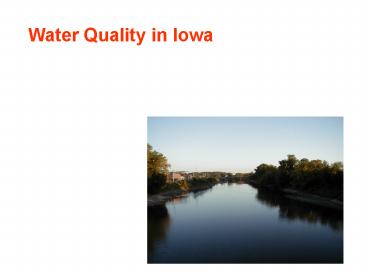Water Quality in Iowa - PowerPoint PPT Presentation
1 / 30
Title:
Water Quality in Iowa
Description:
on the surface in lakes and rivers. underground in 'groundwater' and aquifers. ... ( Black Hawk County is in the High Input/Low Vulnerability category. ... – PowerPoint PPT presentation
Number of Views:22
Avg rating:3.0/5.0
Title: Water Quality in Iowa
1
Water Quality in Iowa
2
- Water Quality in Iowa
- Water occurs in two locations in Iowa
- on the surface in lakes and rivers.
- underground in groundwater and aquifers.
3
- Water Quality in Iowa
- Water occurs in two locations in Iowa
- on the surface in lakes and rivers.
- underground in groundwater and aquifers.
The Iowa River at Iowa City
4
Testing surface water quality in Iowa during 2005.
5
(No Transcript)
6
2005 rainfall in Iowa (it affects water quality)
7
Water Quality in Iowas streams in 2005 was
judged medium (most) and good (some). None
was judged excellent.
8
(No Transcript)
9
Testing what contaminants are in fish is another
specific way to measure Iowas water quality and
its effect on wildlife. Fish can store chemicals
to measurable levels even when levels are below
measurable range in the environment. The graph
at right shows the occurrence of two toxic
organic compounds since the 1970s.
10
PCBs and DDT continue to decline but mercury has
remained steady.
11
Iowa Dept. of Natural Resources, water quality
fact sheet (February 2006), see wqm.igsb.uiowa.edu
12
The water quality of Iowas steams varies over
the yearin general, streams are judged good
(not excellent)the pie charts above show five
year averages (2000-2004).
13
What about Iowas lakes?
14
What about Iowas lakes?
Blue-green algae (cyanobacteria), more commonly
known as pond scum thrives in water with high
concentrations of phosphorus and/or nitrogen. If
conditions are right (warm temperatures), the
algae can grow very quickly (bloom). This can
choke off other forms of life in the lake or
pond. Silver Lake, at right, is high in
cyanobacteria.
15
What has caused the phosphorus and nitrogen
concentrations in Iowa lakes?
- Fertilizer (farm and yard) run-off.
16
What has caused the phosphorus and nitrogen
concentrations in Iowa lakes?
- Fertilizer (farm and yard) run-off.
- Yard debris washed into storm drains (such drains
eventually empty into streams and lakes).
17
What has caused the phosphorus and nitrogen
concentrations in Iowa lakes?
- Fertilizer (farm and yard) run-off.
- Yard debris washed into storm drains (such drains
eventually empty into streams and lakes). - Lack of silt curtains for residential and
industrial building sites (to minimize erosion).
18
What has caused the phosphorus and nitrogen
concentrations in Iowa lakes?
- Fertilizer (farm and yard) run-off.
- Yard debris washed into storm drains (such drains
eventually empty into streams and lakes). - Lack of silt curtains for residential and
industrial building sites (to minimize erosion). - Lack of a plant buffer around lakes (to minimize
erosion).
19
What has caused the phosphorus and nitrogen
concentrations in Iowa lakes?
- Fertilizer (farm and yard) run-off.
- Yard debris washed into storm drains (such drains
eventually empty into streams and lakes). - Lack of silt curtains for residential and
industrial building sites (to minimize erosion). - Lack of a plant buffer around lakes (to minimize
erosion). - Lack of native plant species along shorelines
(these are better at filtering run-off
contaminants than invasive species).
20
Nitrogen in streams and rivers tracks water flow
The more the water flow (due to rain) blue
graph the greater the concentration of nitrogen
purple graph
21
EPA upper limit for drinking
a factor of 2 to 5 Increase
Nitrogen levels in streams have increased in the
last 50 years more fertilizers are used now,
more animal waste washes into streams
Interactive Maps of Iowa, with development and
environmental features http//igsims.igsb.uiowa.e
du/website/Water_Monitoring/viewer.htm
22
What about ground water?
23
What about ground water?
Iowa is at moderate to high risk of ground water
contamination from nitrogen and other
contaminants. Areas in the United States with
the highest risk of nitrate contamination of
shallow ground water (shown in red on the map)
generally have high nitrogen input, well-drained
soils, and less extensive woodland relative to
cropland.
24
A water aquifer, the Silurian-Devonian aquifer,
underlies 90 of Iowa. USGS
25
What about water below ground?
Aquifer A rock formation, group of formations,
or part of a formation that contains sufficient
saturated, permeable material to yield
significant quantities of water to wells and
springs.
26
Dissolved solids in the main aquifer under Iowa
(the Silurian-Devonian aquifer).
27
Sulfate concentrations in the Silurian-Devonian
aquifer. Both figures courtesy of the US Geologic
Survey http//capp.water.usgs.gov/gwa/ch_j/J-text6
.html
28
Drinking water from wells, risk of water
contamination with nitrates. (Black Hawk County
is in the High Input/Low Vulnerability
category.) Reference http//water.usgs.gov/nawqa/
wcp/
29
Nitrate concentration in ground water and percent
of wells in which the nitrate concentration
exceeds the drinking-water standard (10
milligrams per liter) generally decrease with
increasing depth to ground water. (Data shown are
for the high-risk group.) http//water.usgs.gov/n
awqa/wcp/
30
For further information University of Minnesota
Extension Service information about ground water
contamination http//www.extension.umn.edu/distri
bution/naturalresources/DD5866.html US Geologic
Survey water.usgs.gov/nawqa/wcp/ US
Environmental Protection Agency http//www.epa.go
v/safewater/faq/faq.html The Groundwater
Foundation http//www.groundwater.org/gi/sourceso
fgwcontam.html A Purdue University website about
ground water contamination in Indiana http//past
ure.ecn.purdue.edu/AGEN521/epadir/grndwtr/contamin
ation.html































